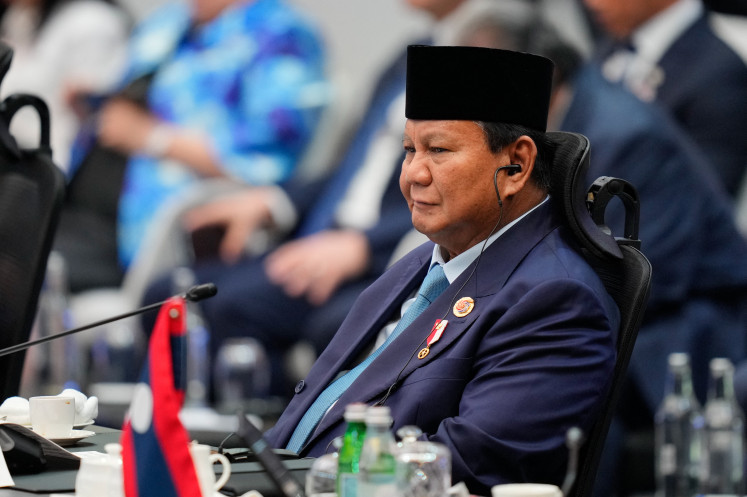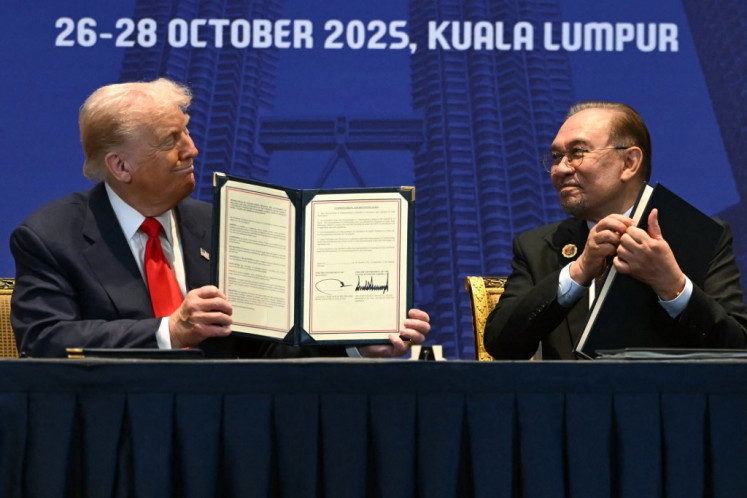Popular Reads
Top Results
Can't find what you're looking for?
View all search resultsPopular Reads
Top Results
Can't find what you're looking for?
View all search resultsGovt asked to enforce DMO ruling
State oil and gas firm PT Pertamina wants the government to strictly apply domestic market obligation (DMO) regulations for natural gas producers due to a rise in international liquefied natural gas (LNG) prices
Change text size
Gift Premium Articles
to Anyone
S
tate oil and gas firm PT Pertamina wants the government to strictly apply domestic market obligation (DMO) regulations for natural gas producers due to a rise in international liquefied natural gas (LNG) prices.
Pertamina spokesman Mochamad Harun said on Thursday that high LNG prices, which currently hover around US$18 per million British thermal units (mmbtu), had decreased the attractiveness of imports from the Middle East.
“Thus, Pertamina encourages the government to impose the DMO, which currently has not been enforced on LNG producers in the country, so that our gas can be utilized optimally for domestic needs,” Harun said in a press statement.
In line with the government’s policy to reduce fuel subsidies by converting users from oil to gas, Indonesia will need around 10 million metric tons per annum (mtpa) of LNG, equal to 1,333 billion British thermal units per day (bbtud), starting in 2013, according to estimates.
Harun said that Indonesia had to take advantage of market conditions to renegotiate LNG sales contracts that locked that nation into prices that were below current international market levels.
Some LNG export contracts have fixed prices far below current market prices, such as a contract signed by Fujian province in China to buy LNG from the Tangguh plant in Papua.
A contract signed in 2002 pegged the price of LNG from Tangguh at $2.40 per mmbtu, regardless of increases in crude oil prices, while LNG prices are typically tied to those of crude oil.
The price was revised to $3.40 per mmbtu in 2006, although the government remained unsatisfied with the new price and intends to renegotiate for a higher sales price.
“The use of LNG for domestic needs is very important to bring more benefits to Indonesia and creates a greater multiplier effect to boost the country’s economic growth in the future,” Harun said.
Pertamina claims that it is the only energy company in Indonesia fulfilling its commitment under the DMO regulation.
Pertamina has allotted 34 percent of its LNG to state gas distributor PT PGN, 20 percent to domestic industries, 18 percent to fertilizer factories, 25 percent for power plants and retained 3 percent for its
own refineries.
As reported earlier, state power company PT PLN wants to import LNG from Australia, Iran and Papua New Guinea to solve a gas shortfall.
PLN has obtained only 800 bbtud of LNG of the 1,800 bbtud it said it needed, leading the state power company to burn more expensive oil-based fuels to meet its power commitments.
To meet PLN’s need, Pertamina and PGN are building a floating storage and re-gasification unit (FSRU) on Jakarta Bay with a total capacity of 3 mtpa, or 400 bbtud, which is scheduled to begin operation in April using LNG from the Bontang LNG plant in East Kalimantan.
Pertamina will also launching another FSRU with the same capacity in Central Java by the first quarter of 2013.
The Energy and Mineral Resources Ministry said separately that LNG for the FSRU might come from the Tangguh LNG plant.
Gas from the Central Java FSRU would be channeled through an integrated Java pipeline project which will be constructed by Pertamina Gas.
In the first phase of development, a 250-kilometer pipeline will be built connecting Semarang, Central Java, and Gresik, East Java. The next phase will connect Cirebon with Muara Tawar.
The pipelines will provide enough supply for all of PLN’s gas-fired power plants and industries in northern Java.










